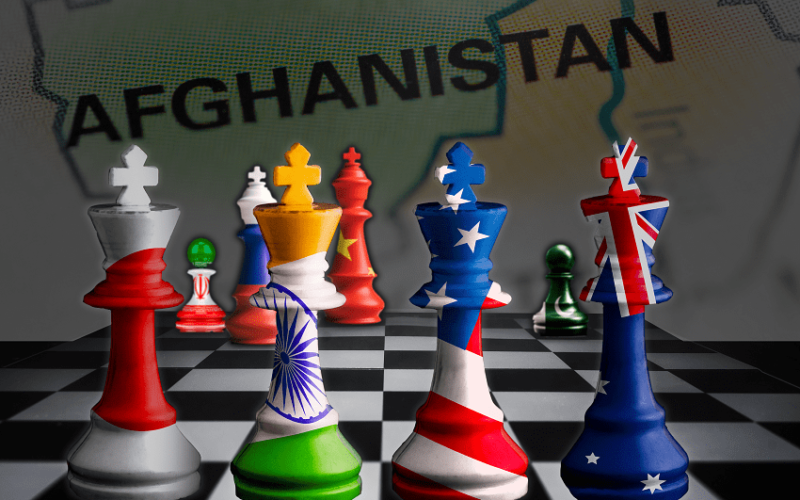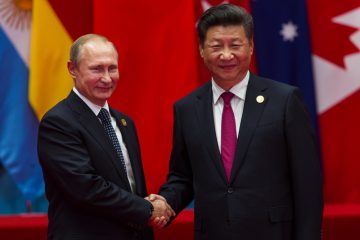Written by : Dr. Pratip Chattopadhyay
Abstract:
The year 2021 began with renewed enthusiasm of the United States of America and its strategic partners in the Indo-Pacific viz. Indian, Japan and Australia to reenergise the Quad forum with the first meeting (virtually) of member countries’ political head taking place in March 2021. However since July the focus of attention of US and India in particular and of world politics in general shifted to Afghanistan where usurpation of power by Taliban is underway to fill up the vacuum created by withdrawal of US troops after two decades from the country. The US is facing criticism for not being able to defend the civilian government in Afghanistan that it protected for so long and India is seemingly isolated in this entire issue it has no opinion at all on this issue! In the latest geopolitical discourse of world politics, the shifting focus from Af-Pak (a term used by Obama administration to denote Afghanistan-Pakistan area as den of world terrorism) to Indo-Pacific and again to Af-Pak, is creating panic among observers of world politics about its future discourse, direction and dilemmas. This piece tries to highlight some of the key concerns in world politics in coming days.
Introduction:
It is a cliché that 21st century is going to be an Asian century as Asia will be the epicenter of world politics. The important point is that while earlier this proposition was based on the presence of India and China, two huge market economy of the world, today it is because of presence of crucial ‘smaller states’ like Afghanistan, Bangladesh, Philippines and other littoral countries in the Indian Ocean who are pulling the strings of foreign policy direction of not only India and China but also of major powers like Russia and United States of America. The recent episode in Afghanistan must be seen in the light of growing adventurism of US in the Indo-Pacific through Quad to resist the domination of China. While US was busy in settling scores with Taliban for the last two decades by focusing its attention in the Afghanistan-Pakistan area, China slowly but gradually cemented its strategic, economical and military stronghold in the South and South-East Asia, a zone now popularly called as Indo-Pacific area. Realising the twin negative impact of such a foreign policy goal (financial loss to maintain a huge army and strategic loss of Indo-Pacific area to China), US under the later period of Trump Presidency decided to withdraw troops from Afghanistan but keep Afghanistan under its radar from its military bases in other parts of Asia particularly in Japan. In this context the first section of the paper discusses the different geopolitical dimensions of Quad while the second section discusses Afghanistan’s present situation. A concluding section argues that world politics is actually heading towards a war of all against all situation and India needs foreign policy course-correction from its eagerness to be a strategic partner of US and its allies to a leading partner of developing world, a role on which it is tested. World politics is heading away from super-power centricity and countries of developing world will hold the key in coming days.
The Geopolitics of Quad:
Quad refers to a quadrilateral security partnership among United States of America, Japan, Australia and India growing out of post-Tsunami disaster relief management in the Indo-Pacific in 2003-04. The genesis of Quad group is rooted in mid level foreign ministry officials meeting of US, Japan, Australia and India on the margins of the ASEAN Regional Forum in Manila in May 2007 to explore the potential for a quadrilateral strategic dialogue. There is something commonsensical about four vibrant committed democracies spanning the Indo-Pacific coming together to discuss their common strategic security interests. Three of the countries are former treaty allies, and India although steadfastly independent in outlook, is engaged in interlocking dialogues which ultimately include all four. A very important point about the dismal condition of the Quad immediately after its formation has been pointed out by Sam Bateman by arguing that “differences of view regarding key law of the sea issues are a fundamental problem of maritime security in the Asia-Pacific region.
The US lacks credibility on the law of the sea while it is not a party to the convention. This places a significant limitation on the ability of the US to play the leadership role in regional maritime security that regional countries expect it to play”(Bateman,2015). The divergent interests of QUAD members converge on their respective problems with China but ultimately it depends on the two Asian giants – India and China on the roadmap of balance of power and security architecture of the continent itself. So Quad is intrinsically linked with India and China because none of the other members of Quad are dispassionately attached to Quad, while Japan wants a gang-up against China, Australia eyes for a new-found regional power status and the United States tries to expand its domination on sea-lanes of communication. India has nothing to gain from Quad but has the fear of losing Chinese economic cordiality.
China on the other hand has everything to gain from Quad – if it does not interfere in expansion of Quad then it will be taken as a high grade moral power and if it shakes hand with Quad as a group (which is not unlikely as with each it has bilateral networking of highest level) it is rest assured of its dominant presence in Asian continent. In the making of Quad 2.0 from 2017 onwards, United States under President Trump wanted to develop a strategic endeavour to balance China’s domination with its strategic allies in the Indo-Pacific. The Biden administration on the other hand, has sought to coalesce the unilateral US narrative on China into an international objection against China (Gandhi,2021). Chinese ambassador to Bangladesh, Li Jimming categorically stated in May 2021 that if Bangladesh joins Quad, it will “substantially damage” bilateral relations between Bangladesh and China. Calling the Quad “a military alliance aimed against China’s resurgence” in South Asia, and threatening Bangladesh not to join this “narrow-purposed” clique, China actually had owned Quad rather than disowning it by giving special importance to it.
The Geopolitics of Afghanistan Conundrum:
If China had owned Quad, United States of America by its explicit presence in Afghan soil for the last two decades have in effect owned the fortune and misfortune of Afghan people and any move in the coming days in Afghanistan will certainly call upon the judgement of US to withdraw all its troops at once in August 2021. However the act of this withdrawal remains questionable due to one on one meet between US President Trump and Taliban leaders in February 2021 followed by a meeting in June 2021 between Russia, Pakistan, China, Taliban and United States of America. The Taliban started their coup after this meeting which gives fillip to the guess that it may be a settled power transfer taking place in Afghanistan. Moreover the manner in which the civilian government led by President Ashraf Ghani succumbed substantiates such claim. More interesting is the fact that on 1st September 2021 Russia and China abstained from voting on Afghanistan issue in UNSC where by rotation India assumes the Chairmanship now.
Afghanistan situation reflects three things – (a) actuality of US presence in Afghanistan was not nation-building or training of Afghan people to democratic ethos but to create a milieu which does not support international terrorism or at least terrorism towards United States of America. Having received enough indications from all stakeholders involved in promoting Terrorism, the US now feels relaxed about the unfolding of events. (b) China and Russia seem to have a good amount of strategic communication involving Pakistan and this could be a new QUAD (China, Pakistan, Russia, Afghanistan) to resist the Quad in Indo-Pacific comprising India, Japan, Australia and US. (c) Taliban seem to be following a message-design of modern governance and transition to power involving dialogue and discussion forums with all stakeholders including those who were in power and also by showing enough respect for the international human rights convention principle by not targeting any foreign national and also by not retaliating with target killings en mass.
Conclusion:
Quad has completed a full circle. What began as an initiative of expanding human security cooperation (post-Tsunami effort) transformed into an initiative of deepening strategic and military partnership through naval exercises like Malabar and finally anchored on pandemic management of Covid. Afghanistan also completed a full circle from US angst against the Taliban to US appreciation of the Taliban. The official language used as a garb respectively in Indo-Pacific and Afghanistan are ‘intelligence sharing’ ‘arc of democracies’, and ‘rule-based order’. As Quad member-states failed to estimate China’s deep-rooted strategic domination through Belt and Road (BRI) project and initiatives like China-South Asia Cooperation Forum(CSACF), US also failed to estimate China’s far-stretched vision through China Pakistan Economic Corridor (CPEC) by which it actually aimed to have economic and strategic engagements with Central Asia through Afghanistan. The language of international law of the sea is being mouthed now by Quad group members to minimize their respective country-wise disadvantage in economic partnership with China. Without becoming a member, it directs and re-directs the moves of Quad member-countries because of its sheer economic clout globally and military clout in the Indo-pacific. In Afghanistan too, despite its distant geographical presence, China has fooled the US to become the kingmaker without investing as much as the US did for the last two decades. The lesson that Quad and Kabul offers is a sign of a declining superpower (USA) and a rise of a geo-strategic and geo-economic superpower (China).
Contemporary world politics is actually heading towards Hobbesian state of nature (war of all against all) in place of Kantian world of ‘perpetual peace’, a dream that United States of America tried to sell through its neo-liberal economic order and ‘democratic peace’ theory. Afghanistan and Quad grouping has proved that super-power centric world politics is coming to an end. Be it United States or China, singularly none can direct the course of world politics. Otherwise small states of Central, South and South-East Asia are becoming important stakeholders. In this context India under the present dispensation has lost credibility in their longstanding friendly circle of developing countries. India’s policy towards Iran, Indo-Pacific and Afghanistan reflect dovetailing US policy that reflects power-mongering tendencies contrary to what the world knew India for – democracy, dialogue and defiance. In its quest for atrmnanirbhor (self-reliant) foreign policy, India actually has turned its foreign policy as poronirbhor (dependent) on the moves of United States of America. Thus India today is at the receiving end of Russian and Chinese foreign policy. As world politics is heading towards a chaos wherein small states of developing world are going to play the trick, India, presently as rotational chairman of UNSC has a huge responsibility to correct its own foreign policy course to exemplify collective security in place of collective insecurity as key driving force in world politics.
(The views expressed in this article are the author’s own and do not necessarily reflect Multidimension’s editorial stance.)
About the author :
Pratip Chattopadhyay
Assistant Professor, Department of Political Science, University of Kalyani, West Bengal, India
References:
Bateman, Sam. 2015. ‘ Maritime Security and the Law of the Sea’ in Walter Lohman, Lt. General Ravi K Sawhney Andrew Davies Ippeita Nishida eds. The QUAD Plus : Towards a Shared Strategic Vision of the Indo-Pacific. Wisdom Tree, New Delhi.
Gandhi, Prerna.2021. ‘Changing American Perspective on Quad from Trump to Biden’.




